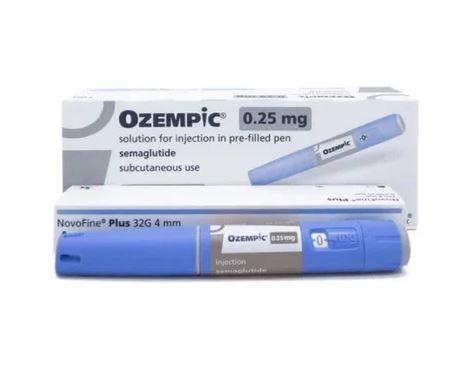Can You Mix Benadryl and Alcohol?
Can you mix alcohol and Benadryl? No. If you are taking Benadryl for allergy relief, it is best to avoid alcohol until you know how your body reacts to the medication. Nevertheless, combining any drugs (prescribed or not prescribed) with alcohol can have unforeseen and undesirable effects.
Alcohol and Benadryl (diphenhydramine) have the same sedative effects, making you feel drowsy, dizzy, or lightheaded. Together, they can enhance each other’s sedative effects and increase the risk of side effects, such as dizziness, drowsiness, and impaired coordination. Moreover, alcohol can interfere with how Benadryl is metabolized by the liver, leading to increased drug levels in the bloodstream. This can increase the risk of side effects or Benadryl overdose.
Therefore, it is generally not recommended to mix alcohol and Benadryl. If you are taking Benadryl for allergy symptoms or sleep aid, it is best to avoid alcohol or consult with your healthcare provider before combining the two.
The Dangers of Mixing Alcohol and Benadryl
Benadryl (diphenhydramine) is a brand name of an over-the-counter (OTC) medication that’s classified as an antihistamine. It’s used to help relieve symptoms of seasonal allergies such as hay fever, other allergies, and the common cold, as well as itchy skin due to insect bites, hives, and other causes.
When Benadryl and alcohol are mixed, the combination can be dangerous. While Benadryl doesn’t affect the liver, it is a central nervous system (CNS) depressant. People may not realize that alcohol is also a depressant. When alcohol and Benadryl are mixed together, the impact on the central nervous system (brain and spinal cord) can lead to severe and heightened side effects. In some cases, this combination can be life-threatening.
When consumed, Benadryl acts as a depressant for the nervous system. Drugs classified as depressants slow down the body’s nerve and brain function. Usually, this slow-down effect is not dangerous but can become threatening if another depressant is taken simultaneously. Benadryl and alcohol are both CNS depressants. An individual may have forgotten they took Benadryl or did not know about the potential dangers. Either way, the two combined in the body can take a severe toll.
First-generation antihistamines will cause drowsiness in just about everybody, and alcohol does that too. If someone takes antihistamines and alcohol, the chance of having a double dose of that drowsiness is very high. Depression of the central nervous system (CNS) can cause a slow breathing rate, decreased heart rate, and loss of consciousness, leading to a coma in rare cases.
Is Benadryl Addictive?
Benadryl stops the body from producing histamine in response to drug or peanut allergies. Benadryl has a sedative effect when taken, which is why most people who experience insomnia utilize it as a sleep aid. The substance has become one of the most overused because of its accessibility in pharmacies and grocery stores.
Benadryl’s main component, diphenhydramine, is highly addictive. Although the medication treats diseases like sleeplessness, nausea, the common cold, and Parkinson’s sufferers’ tremors, it can become addictive daily in liquid, tablet, or capsule form.
Can You Get Addicted to Benadryl?
Since Benadryl is used to treat various medical conditions, developing Benadryl addiction might not be intentional. Those who use the medicine to treat their insomnia risk developing Benadryl addiction. Patients with Parkinson’s disease who receive a prescription for Benadryl to treat their tremors and muscle spasms also risk becoming addicted to the medication. Patients with schizophrenia are more likely to get addicted because Benadryl helps them cope with the negative effects of antipsychotic medication use.
Those dealing with anxiety turn to Benadryl because it puts them in complete and utter relaxation. However, this reason for use often leads to Benedryl addiction. Benadryl is cheap and can be procured without a doctor’s prescription, making it prone to abuse.
Diphenhydramine HCl and Alcohol
Diphenhydramine is a sedative drug that treats allergic conditions like hives, hay fever, and asthma. Diphenhydramine is marketed under the brand name Benadryl. It’s also used to treat symptoms of Parkinson’s disease and Tourette’s syndrome. Diphenhydramine HCL with alcohol is a deadly combination. In some cases, Benadryl and alcohol may be harmful when taken in combination. This can lead to drowsiness, confusion, or dizziness. If you’re taking these drugs together and experience any of these effects, stop taking them immediately and seek medical attention.
Certain antidepressants can interact with Diphenhydramine mixed with alcohol. These include tricyclic antidepressants (TCAs), selective serotonin reuptake inhibitors (SSRIs), and serotonin and norepinephrine reuptake inhibitors (SNRIs). Monoamine oxidase inhibitors (MAOIs) can also interact with diphenhydramine.
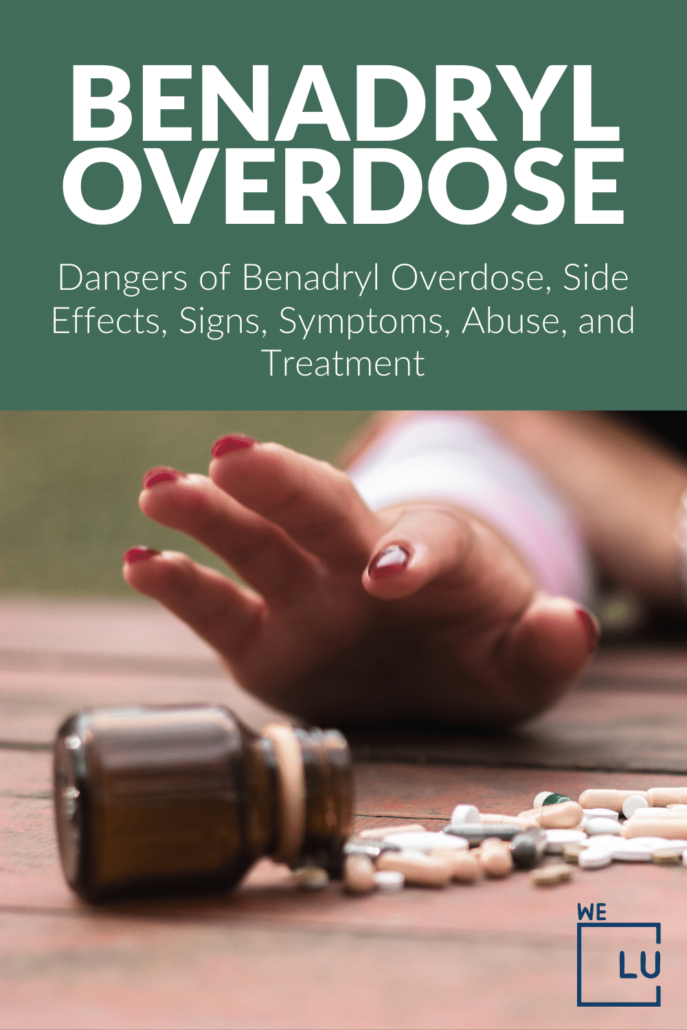
Skip To:
Learn More:

Get Your Life Back
Find Hope & Recovery. Get Safe Comfortable Detox, Addiction Rehab & Mental Health Dual Diagnosis High-Quality Care at the We Level Up Treatment Centers Network.
Hotline (877) 378-4154Benadryl (Diphenhydramine) Drug Facts
Generic Name: Diphenhydramine [ DYE-fen-HYE-dra-meen ]
Drug Classes: Anticholinergic antiemetics, Anticholinergic antiparkinson agents, Antihistamines, Miscellaneous anxiolytics, sedatives and hypnotics
Availability: Over-the-counter with a present Pharmacist
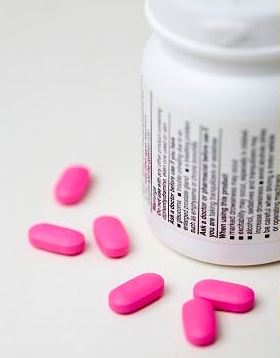
Benadryl is the brand name for the medication diphenhydramine. It is an antihistamine medication used to treat symptoms caused by allergies such as itching, runny nose, sneezing, hives, and rashes. It can also be a sleep aid to relieve motion sickness symptoms.
Benadryl is available in various forms, including tablets, capsules, liquid, and topical creams.
It is crucial to follow the dosing instructions carefully, as taking too much can cause side effects such as drowsiness, dry mouth, and dizziness.
It is recommended to consult a healthcare provider before taking Benadryl, especially if you have any medical conditions or are taking other medications.
Benadryl and Alcohol Use Disorder Statistics
About 40% of individuals who know they have an alcohol or drug problem, such as Benadryl and alcohol abuse, are not ready to stop using, and many others simply feel they do not have a problem or a need for treatment.
18%
Antihistamines, generally used for allergies, were involved in at least 18 percent of drug overdose deaths from 2019 to 2020.
Source: CDC
71%
More than 71 percent of those drug overdose deaths included diphenhydramine, sold by its brand name Benadryl.
Source: CDC
90
90 fatalities – less than 0.1% – involved antihistamines as the single medication, while opioids were linked to more than 82% of the drug overdose deaths.
Source: CDC
Can You Drink Alcohol with Benadryl (Diphenhydramine)?
How much alcohol can you drink with Benadryl? Benadryl and alcohol, when mixed together, is a strong drug. It must not be consumed with alcohol to be used safely. There is no specific amount of alcohol that can be said as “safe.” Alcohol and Benadryl can interact dangerously, impairing motor control and attention and causing excessive sleepiness. For some people, especially those with asthma or nasal issues, drinking alcohol can worsen their allergy symptoms. Histamines can develop during the production of alcoholic beverages, according to studies. Furthermore, some people may experience severe allergy symptoms if they take this since the drink works against the medication’s effects. Can you take diphenhydramine with alcohol? The answer is No.
Risks and Side Effects of Mixing Benadryl and Alcohol
Drowsiness
- Benadryl can cause side effects, including drowsiness, sedation, impaired reaction speed, and coordination. Combining Benadryl with alcohol can intensify these side effects and impair an individual’s daily functioning. This can be fatal if it involves certain activities, such as driving or operating heavy machinery.
Loss of Consciousness
- Some individuals are more prone than others to losing consciousness when sedated. In these individuals, mixing Benadryl and alcohol is more likely to cause a loss of consciousness. This can be dangerous due to the likelihood of falls and other accidents.
Dehydration
- Benadryl and alcohol are both known to dehydrate the body. Combining them can increase the risk of dehydration. This can cause discomfort at the time and may worsen a hangover.
Complications in Older Adults
- Aging slows the body’s ability to break down alcohol so that it may stay in the system of an older adult for longer than someone younger. This slowdown increases the time a person will be at risk of harmful Benadryl alcohol interaction.
Learning and Memory Impairment
- Benadryl blocks the action of a neurotransmitter called acetylcholine. Acetylcholine is necessary for memory and learning, so blocking its action may temporarily impair these processes.
- Alcohol is also known to inhibit memory and learning temporarily. So, mixing Benadryl and alcohol may again have a more noticeable effect on learning and memory.
Get Help. Get Better. Get Your Life Back.
Searching for Accredited Drug & Alcohol Rehab Centers Near You? Or Mental Health Support?
Even if you have failed previously, relapsed, or are in a difficult crisis, we stand ready to support you. Our trusted behavioral health specialists will not give up on you. Call us when you feel ready or want someone to speak to about therapy alternatives to change your life. Even if we cannot assist you, we will lead you wherever you can get support. There is no obligation. Call our hotline today.
FREE Addiction Hotline – Call 24/7Benadryl Interactions with Other Types of Medication
Benadryl may interact with other types of medication, which can increase the side effects. Taking these other medications with alcohol could also increase the risk of side effects. Alcohol and diphenhydramine interactions are strong because they are both CNS depressants. When taken together, their effects on the body may be additive or synergistic.
Benadryl and numerous prescription medications can interact with alcohol, including antibiotics, antidepressants, antihistamines, barbiturates, benzodiazepines, histamine H2 receptor antagonists, muscle relaxants, nonnarcotic pain medications and anti-inflammatory agents, opioids, and warfarin.
Examples of medications that may interact with Benadryl include:
- Sedatives
- Antidepressants
- Stomach ulcer medicine
- Cough and cold medicine
- Other antihistamines
- Diazepam (Valium)
Other Sources of Alcohol
- Some types of medication, including laxatives and cough syrup, also contain alcohol. They can include up to 10 percent alcohol, which may interact with Benadryl.
- Consequently, taking Benadryl with these medications when consuming tiny amounts of alcohol may still increase the risk of adverse side effects.
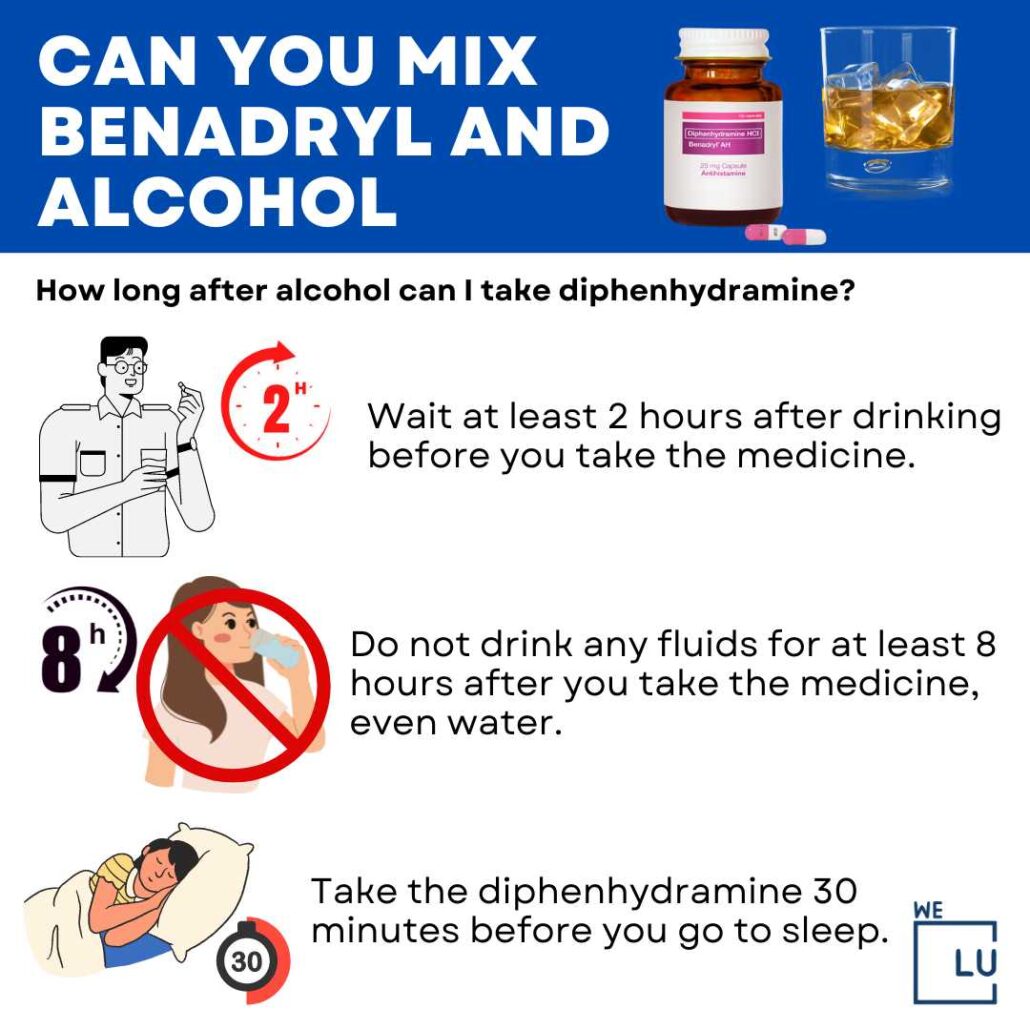
Benadryl and Alcohol Interaction
Sex
- In general, females are more susceptible to alcohol-related harm. This is because their bodies typically contain less water for alcohol to mix, meaning that the same amount of alcohol would be more concentrated in a female than in a male.
- Mixing Benadryl with alcohol may be particularly hazardous for females, as consuming smaller amounts of alcohol could trigger adverse Benadryl and alcohol interaction effects.
Misuse
- As Benadryl and alcohol both cause sedation and drowsiness, it may seem tempting to exploit this combination as a sleeping aid. However, this can also heighten other adverse side effects that interfere with sleep, such as dizziness and nausea.
Dementia
- Excessive alcohol consumption is associated with a higher risk of dementia. It is possible that consuming large amounts of Benadryl and alcohol over long periods could be linked to an increased risk of dementia.
- However, longitudinal research would be required on people who consume high levels of Benadryl and alcohol to know whether this affects the risk of dementia.
Benadryl and Alcohol Overdose
Can I take Benadryl with alcohol? An excessive combination of Benadryl and alcohol could lead to an overdose. However, you would likely have to ingest significant doses of both drugs. Death is one of the risks if you overdose on alcohol and Benadryl and lose consciousness.
While Benadryl is an over-the-counter (OTC) medication commonly used, it can cause dangerous side effects. That’s why it should never combine with alcohol. Taking more than the directed dose of Benadryl makes an overdose more likely. Side effects will be uncomfortable rather than euphoric. Anecdotal evidence about Benadryl highs suggests that the results are more unsettling than enjoyable.
Do not underestimate how dangerous this medication is; just because it is available without a prescription doesn’t mean it can’t kill you if you take enough of it. There is a fine line between being a bit sleepy and having significant problems like heart problems and seizures, which can be life-threatening. According to research published by the National Institute for Biotechnology Information (NCBI) [1], a 2016 study demonstrated that diphenhydramine or Benadryl overdoses comprised 3.2% of drug overdose deaths in the U.S. In the same study, diphenhydramine ranked among the top 15 drugs most frequently involved in drug overdose deaths in the U.S.
Signs of Benadryl Overdose
Can you overdose on Benadryl and alcohol? Yes. Signs and side effects of overdose on Benadryl may include:
- Enlarged pupils
- Agitation
- Dry eyes
- Blurry vision
- Delirium
- Ringing in the ears (tinnitus)
- Low blood pressure
- Rapid heart rate
- Mood swings
- Restlessness
- Inability to urinate
- Confusion
- Seizures
- Intense, sudden depression
- Extreme drowsiness
- Dry, red skin
- Passing out or falling asleep
- Nervousness or paranoia
- Physical tremors
- Unsteady gait
- Loss of balance or inability to walk
- Nausea or vomiting
Taking Benadryl with other potent drugs can also increase the risk of overdose. These drugs include:
- Other antihistamines
- Benzodiazepines including Valium, Xanax, Klonopin
Benadryl and Alcohol Death
Death is one of the risks of excessive alcohol and Benadryl interaction. Despite being widely utilized and conveniently accessible over the counter, Benadryl can have harmful adverse effects. You should never combine it with alcohol because of this. Usually, Benadryl.and alcohol overdose symptoms appear within the first two hours of taking them. Toxic effects, including heart attack, kidney failure, pancreatitis, and coma, cause antihistamine and alcohol death. Benadryl and alcohol death is possible when these are not taken with caution.
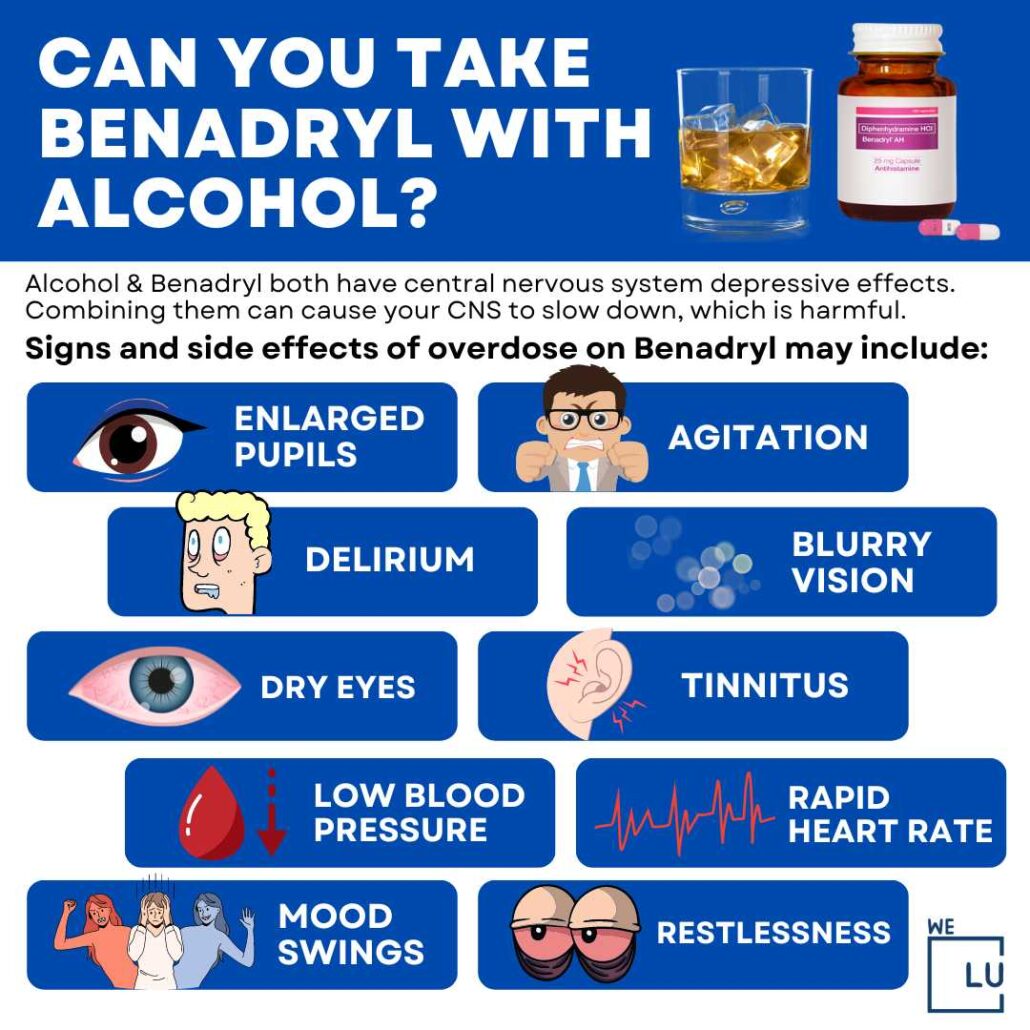
What Is an Alcohol Overdose?
An alcohol overdose happens when there is so much alcohol in the bloodstream that areas of the brain controlling basic life-support functions—such as heart rate, breathing, and temperature control—start to shut down. What tips the balance from drinking that produces impairment to drinking that puts one’s life in danger varies among individuals. Sensitivity to alcohol (tolerance), age, drinking speed, gender, medications you are taking, and amount of food eaten can all be factors.
Alcohol use and taking opioids or sedative-hypnotics, such as sleep and anti-anxiety medications, can increase your risk of an overdose. These medications include sleep aids such as zolpidem, eszopiclone, and benzodiazepines such as diazepam and alprazolam. [2]
Even drinking alcohol while taking over-the-counter antihistamines such as Benadryl can be dangerous. Using alcohol with opioid pain relievers such as morphine and oxycodone or illicit opioids such as heroin is also very dangerous. Like alcohol, these drugs suppress areas in the brain that control vital functions such as breathing. Ingesting alcohol and other drugs together intensifies their individual effects and could produce an overdose with even moderate amounts of alcohol.
Critical Signs and Symptoms of an Alcohol Overdose
Drinking alcohol and taking Benadryl makes it harder for people of all ages to control body movement well. But it may be even riskier for seniors.
- Mental confusion, stupor
- Difficulty remaining conscious or inability to wake up
- Vomiting
- Seizures
- Slow breathing (fewer than eight breaths per minute)
- Irregular breathing (10 seconds or more between breaths)
- Slow heart rate
- Clammy skin
- Dulled responses, such as no gag reflex (which prevents choking)
- Shallow body temperature, bluish skin color, or paleness
How long after alcohol can I take diphenhydramine?
- Wait at least 2 hours after drinking before you take medicine.
- Do not drink fluids for at least 8 hours after taking medicine, even water.
- Take the diphenhydramine 30 minutes before you go to sleep. Do not take more than one capsule per dose; never take more than six daily doses.
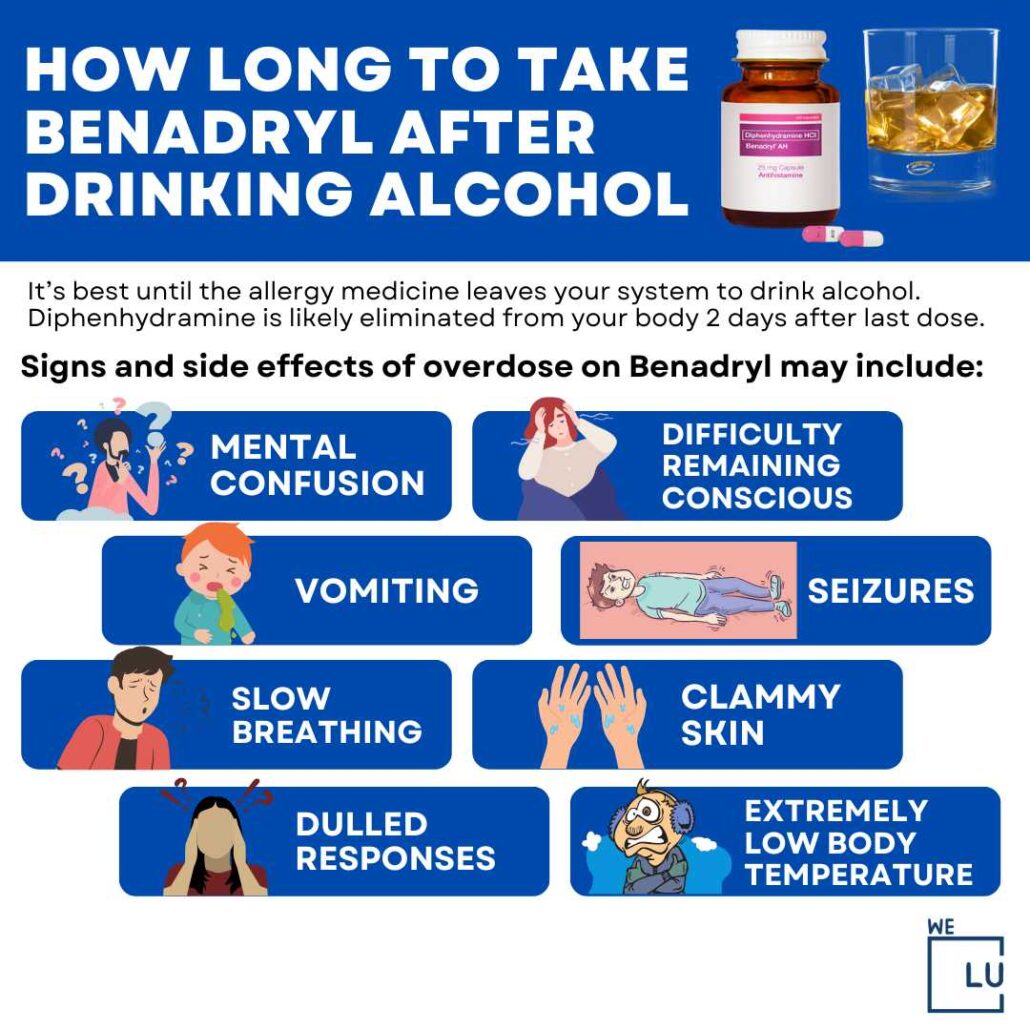
First-class Facilities & Amenities
World-class High-Quality Addiction & Mental Health Rehabilitation Treatment
Rehab Centers TourRenowned Addiction Centers. Serene Private Facilities. Inpatient rehab programs vary.
Addiction Helpline (877) 378-4154Proven recovery success experience, backed by a Team w/ History of:
15+
Years of Unified Experience
100s
5-Star Reviews Across Our Centers
10K
Recovery Success Stories Across Our Network
- Low Patient to Therapist Ratio
- Onsite Medical Detox Center
- Comprehensive Dual-Diagnosis Treatment
- Complimentary Family & Alumni Programs
- Coaching, Recovery & Personal Development Events
Benadryl and Alcohol Abuse, Withdrawal, and Treatment
Benadryl is available without a prescription. It is common for people to believe that it is safe. However, this over-the-counter medication has many addictive qualities compared to other prescription and street drugs. [3] When combined with alcohol, abuse of Benadryl can be dangerous and potentially life-threatening.
Polydrug Abuse of Benadryl and Alcohol
Benadryl can be abused if people use it incorrectly. People may misuse and abuse Benadryl for delirium since it is readily available. The symptoms can be severe and are even worse if the drug is combined with other substances like alcohol. A person can develop tolerance and Benadryl addiction. Many people who abuse medications containing these ingredients experience side effects like hallucinations and sleepiness.
Polydrug abuse is the improper use of multiple drugs or substances, such as diphenhydramine with alcohol, simultaneously, which is dangerous. The combined effects of Benadryl and alcohol enhance the desired effect of the individual drugs and intensify each substance’s potentially harmful side effects.
It is important to remember that mixing drugs can bring about unpredictable results. Also, the short-term and long-term consequences of polydrug abuse are challenging for medical professionals to predict as they vary based on the combination and amount of substances used.
Alcohol Withdrawal
- According to the National Institute of Health (NIH) [4], alcohol withdrawal is a symptom that may happen when someone who has been drinking too much alcohol regularly suddenly stops drinking alcohol. Alcohol withdrawal symptoms usually happen within 8 hours after the last drink but can occur days later. Symptoms typically peak in 24 to 72 hours but may go on for weeks.
Common symptoms include:
- Anxiety or nervousness
- Depression
- Fatigue
- Irritability
- Jumpiness or shakiness
- Mood swings
- Nightmares
- Not thinking clearly
A severe form of alcohol withdrawal called delirium tremens (DT) can cause:
- Agitation
- Fever
- Seeing or feeling things that aren’t there (hallucinations)
- Seizures
- Severe confusion
Withdrawal from Benadryl and Alcohol
Withdrawal from multiple drugs or substances is significantly more complicated than withdrawal from one substance. Because of this, it is essential and potentially lifesaving to undergo detox in an inpatient, medically assisted setting.
Benadryl for Alcohol Withdrawal
- Benadryl can be used to help people with alcohol withdrawal symptoms. It must be taken every four hours for the first day, then every six hours afterward. This medication should be taken with food or milk if possible. Consult a doctor first. Self-medication is always dangerous.
Diphenhydramine or Benadryl Withdrawal
Diphenhydramine (Benadryl) addiction withdrawal is a real threat. People who abruptly stop taking this drug after becoming addicted may suffer severe antihistamine withdrawal symptoms.
Presently, no known medications aid in easing withdrawal from Benadryl symptoms. As with most drugs used for prolonged periods, tapering down is always the safest and least unpleasant bet.
Signs and Symptoms of Benadryl withdrawal include:
- Nausea and diarrhea
- Insomnia and restlessness
- Stomach cramps
- Hot and cold sweats
- Sweating
- Irritability
- Cold-like symptoms
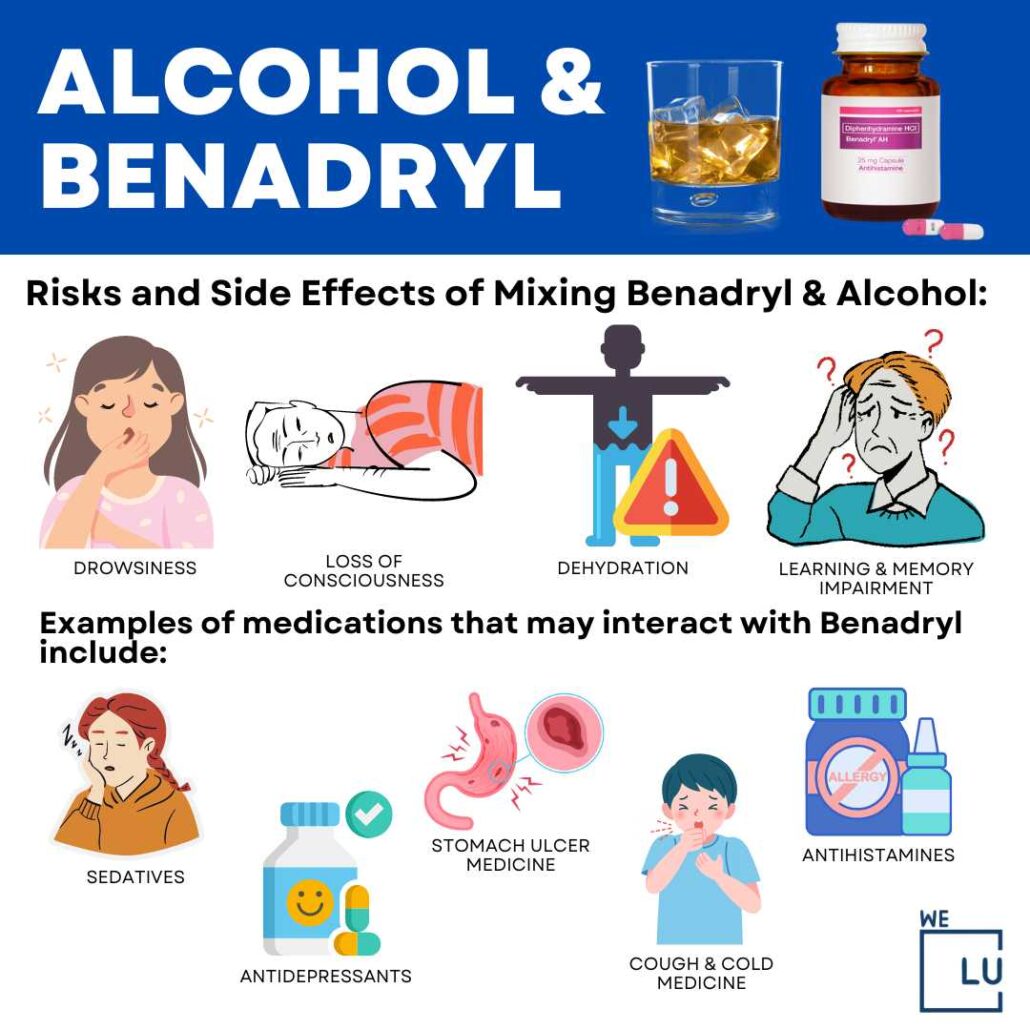
World-class, Accredited, 5-Star Reviewed, Effective Addiction & Mental Health Programs. Complete Behavioral Health Inpatient Rehab, Detox plus Co-occuring Disorders Therapy.
CALL (877) 378-4154End the Addiction Pain. End the Emotional Rollercoaster. Get Your Life Back. Start Drug, Alcohol & Dual Diagnosis Mental Health Treatment Now. Get Free No-obligation Guidance by Substance Abuse Specialists Who Understand Addiction & Mental Health Recovery & Know How to Help.
Benadryl and Alcohol Abuse Treatment
As alcohol and substance use disorder treatment advances, clients are encouraged to modify their thoughts and behaviors to promote healthier and safer responses to events, situations, and people that would once have resulted in turning to substances as a coping mechanism.
Medically-Assisted Detox
Highly trained medical professionals will provide the individual 24/7 supervision during a medically assisted detox program. They will be available to monitor your vital signs (including heart rate, blood pressure, respiratory rate, and temperature) and intervene in a medical emergency.
Withdrawing alcohol on its own can be difficult. However, withdrawing from alcohol simultaneously with another substance, such as Benadryl, adds to the potential risk. For this reason, continual monitoring is essential to ensuring your safety.
The encouragement provided in a medically assisted detox program decreases the possibility of relapse after treatment and improves the chances of safely and successfully transitioning into a therapy program.
Inpatient or Residential Treatment
Although completing detox removes the immediate dangers of polysubstance abuse, it is not an effective standalone treatment for an addiction to alcohol and Benadryl. Detox must be followed by evidence-based, comprehensive addiction treatment that includes therapy to help you learn more about the roots of your addiction and better understand the triggers that further addictive behaviors.
Therapy for substance use disorders often includes different types of psychotherapy. The most common type of therapy used in addiction treatment is cognitive-behavioral therapy or CBT. Cognitive-behavioral therapy encourages people to analyze and examine their behaviors and thoughts to understand their addiction’s causes.
Find the Right Treatment Plan at We Level Up New Jersey
Polydrug abuse can lead to severe consequences. If your loved one had tried to quit in the past but ended up using Benadryl and alcohol again, that’s a clear sign they need professional help. Get them the safest help they need and deserve. Our team at We Level Up New Jersey treatment center specializes in creating an ideal environment for a future free of substances. Call us today for treatment resources and information. Each call is private and confidential.
Top 5 Benadryl and Alcohol FAQs
-
Can you drink alcohol and take Benadryl?
No. It is not recommended to drink alcohol after taking Benadryl (diphenhydramine), an antihistamine medication used to relieve allergy symptoms.
-
Can I mix Benadryl and alcohol? What happens when you mix Benadryl and alcohol?
Alcohol can intensify the side effects of Benadryl, such as dizziness, drowsiness, and impaired coordination. This can increase the risk of accidents or injuries. Additionally, alcohol can also increase the likelihood of experiencing other side effects of Benadryl, such as dry mouth, blurred vision, and difficulty urinating.
-
Can you OD on Benadryl and alcohol?
Yes. Taking high doses of Benadryl with alcohol can also lead to more severe side effects such as low blood pressure, slowed breathing, and even coma.
-
Can you take Benadryl and drink alcohol? Can you die from Benadryl and alcohol?
You cannot take Benadryl with alcohol. If you are considering drinking alcohol after taking Benadryl, it is recommended that you wait until the effects of the medication wear off, which can take several hours. Consult with a doctor or pharmacist before combining any medications or substances.
-
What happens if you mix Benadryl and alcohol? Is Benadryl and alcohol safe?
It is never safe to combine Benadryl and alcohol. It is not recommended to mix alcohol and Benadryl. If you need to take Benadryl for allergy or sleep, it’s better to avoid alcohol completely or at least wait several hours after taking Benadryl before consuming any alcohol. It’s always a good idea to speak with your healthcare provider about the potential risks of combining medications and alcohol.
Accordion title 1
This is a placeholder tab content. It is important to have the necessary information in the block, but at this stage, it is just a placeholder to help you visualise how the content is displayed. Feel free to edit this with your actual content.
Accordion title 2
This is a placeholder tab content. It is important to have the necessary information in the block, but at this stage, it is just a placeholder to help you visualise how the content is displayed. Feel free to edit this with your actual content.
Accordion title 1
This is a placeholder tab content. It is important to have the necessary information in the block, but at this stage, it is just a placeholder to help you visualise how the content is displayed. Feel free to edit this with your actual content.
Accordion title 2
This is a placeholder tab content. It is important to have the necessary information in the block, but at this stage, it is just a placeholder to help you visualise how the content is displayed. Feel free to edit this with your actual content.
Alcohol Poisoning Symptoms Video
Drinking much alcohol quickly can have dangerous and fatal side effects, such as alcohol poisoning. A coma or death may result from too much alcohol too quickly, which can also affect your respiration, heart rate, body temperature, and gag reflex. Severe alcohol intoxication necessitates immediate medical attention. If you believe someone may have alcohol poisoning, call 911 to obtain immediate emergency medical care.
Alcohol poisoning is an urgent situation If you have any suspicions, even if you don’t notice the classic symptoms or indicators of alcohol poisoning, you should get immediate medical help.
What you need to do for alcohol poisoning is:
- Dial your local emergency number or 911 right away.
- Never rely on someone recovering from alcohol poisoning to sleep.
- Be prepared to share details.
- If you are aware, let medical staff or emergency workers know what kind, how much, and when the patient drank alcohol.
- Never leave a person who is unconscious alone.
- Someone with alcohol poisoning may choke on their own vomit and become unable to breathe because alcohol poisoning alters how the gag reflex functions. Don’t try to make the victim throw up while you wait for assistance; you risk making them choke.
- Help someone who is throwing up.
- Make an effort to keep the person seated.
- Turn the person’s head to the side if they must lie down; this will help them from choking. To prevent unconsciousness, make an effort to keep the person awake.
Experience Transformative Recovery at the We Level Up Treatment Center.
See our authentic success stories. Get inspired. Get the help you deserve.



Start a New Life
Begin with a free call to an addiction & behavioral health treatment advisor. Learn more about our dual-diagnosis programs. The We Level Up treatment center network delivers various recovery programs at each treatment facility. Call to learn more.
- Personalized Care
- Caring Accountable Staff
- World-class Amenities
- Licensed & Accredited
- Renowned w/ 5-Star Reviews
We’ll Call You
Can You Mix Benadryl and Alcohol? Video
The combination of alcohol and Benadryl (diphenhydramine) can be hazardous. Both substances have sedative effects, intensifying drowsiness, dizziness, and impaired coordination. Learn why it’s crucial to avoid this mix and what potential consequences may arise.
Search We Level Up NJ Benadryl and Alcohol Detox, Mental Health Topics & Resources
Sources
[1] Huynh DA, Abbas M, Dabaja A. Diphenhydramine Toxicity. [Updated 2022 May 8]. In: StatPearls [Internet]. Treasure Island (FL): StatPearls Publishing; 2022 Jan-. Available from: https://www.ncbi.nlm.nih.gov/books/NBK557578/
[2] Understanding the Dangers of Alcohol Overdose – National Institute on Alcohol Abuse and Alcoholism (NIAAA)
[3] Key Substance Use and Mental Health Indicators in the United States: Results from the 2020 National Survey on Drug Use and Health – Substance Abuse and Mental Health Services Administration (SAMHSA)
[4] Alcohol withdrawal – U.S. Department of Health and Human Services National Institutes of Health
[5] We Level Up Treatment Center – Prescription Drug Abuse
[6] We Level Up Treatment Center – Alcohol Detox
[7] Dangers Of Mixing Benadryl And Alcohol & Effective Addiction Treatment Options (welevelup.com)
[8] Saran JS, Barbano RL, Schult R, Wiegand TJ, Selioutski O. Chronic diphenhydramine abuse and withdrawal: A diagnostic challenge. Neurol Clin Pract. 2017 Oct;7(5):439-441. DOI: 10.1212/CPJ.0000000000000304. PMID: 29620065; PMCID: PMC5874453.
[9] Rehm J. The risks associated with alcohol use and alcoholism. Alcohol Res Health. 2011;34(2):135-43. PMID: 22330211; PMCID: PMC3307043.
[10] Jung YC, Namkoong K. Alcohol: intoxication and poisoning – diagnosis, and treatment. Handb Clin Neurol. 2014;125:115-21. DOI: 10.1016/B978-0-444-62619-6.00007-0. PMID: 25307571.





